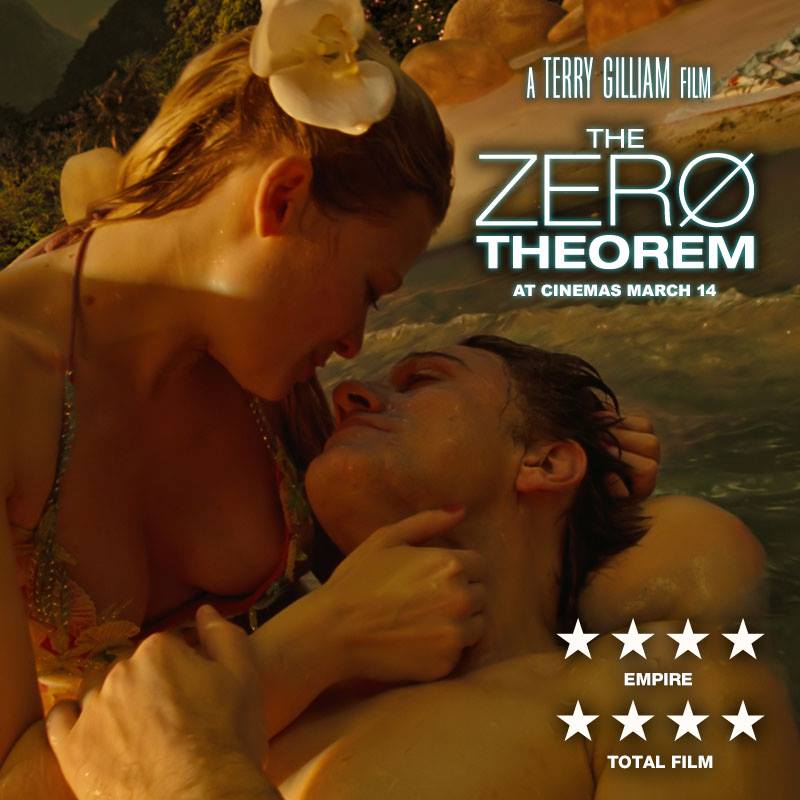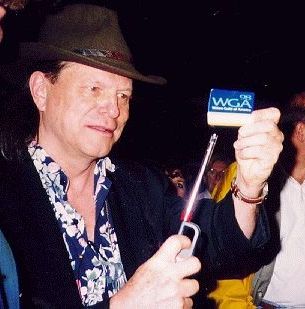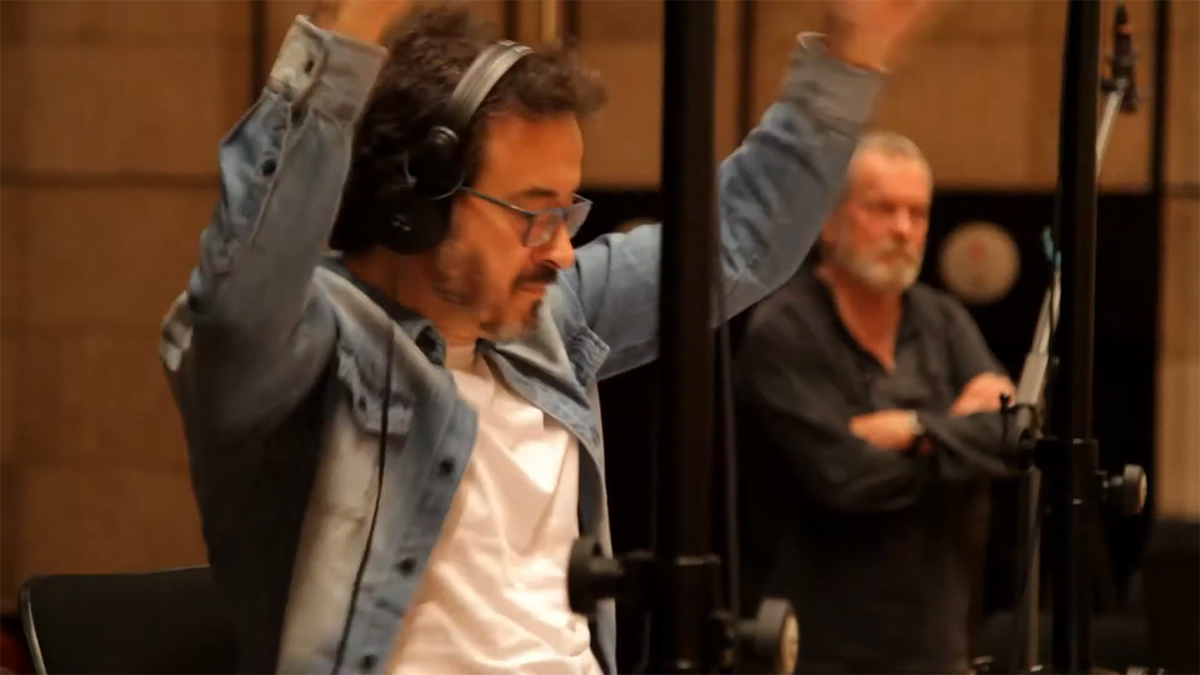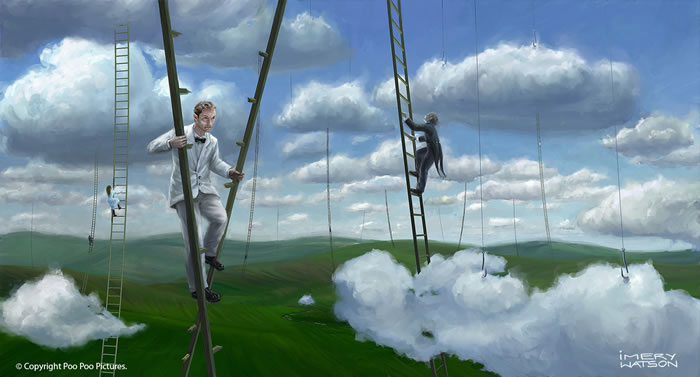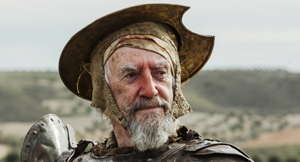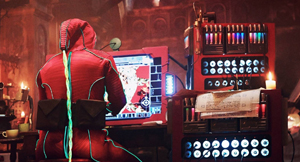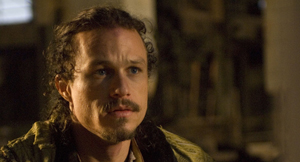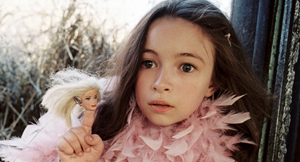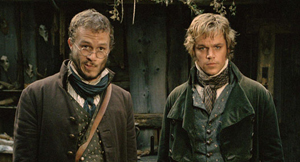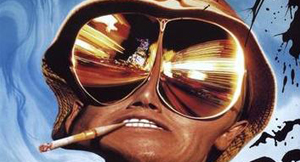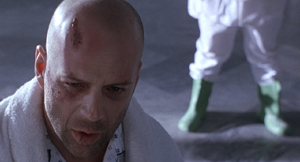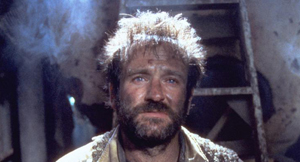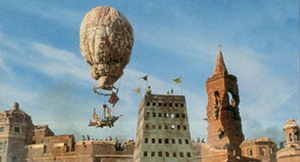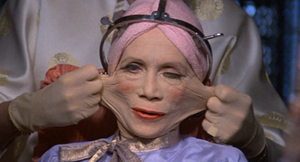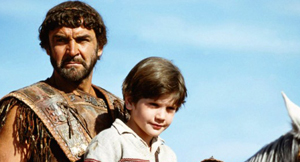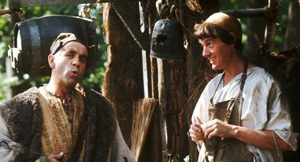Terry Gilliam discusses his new picture The Zero Theorem in depth, with Phil Stubbs
MARCH 2014 – This is the third interview with Terry Gilliam at Dreams about The Zero Theorem, and the longest. In the first, from August 2012, the director spoke about preproduction for the film. The second, from November 2012, took place in the back of a car after a long day of shooting, heading back to Bucharest city centre.
For this interview, Terry Gilliam was in London, and postproduction was almost complete. The picture was edited, the soundtrack was complete, but just a few effects shots were outstanding. Gilliam here talks in depth, reflecting on the production problems, the postproduction and the themes within The Zero Theorem.
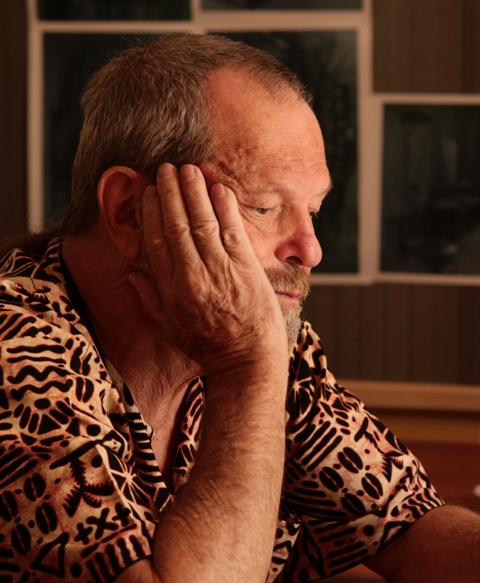
Terry Gilliam snapped during preproduction in Bucharest
Phil Stubbs: Let me just start by getting my iPhone working here…
Terry Gilliam: We were cutting the movie and I needed Christoph to say a new line. It was before we started doing all the ADR postsynching work and I just wrote to him telling him that I wanted to change that line. Then he recorded it on his iPhone and sent it over, and it’s in the movie. Also, there is one bit on the Bainsley website where I recorded, what’s in there is me, a raunchy character – it’s all done on the iPhone.
And then only a week ago, I had this new idea about the ending with Melanie saying something. Again, I did a little version, and emailed that over to her. She did several takes on her iPhone and emailed it back, and that’s what’s in the movie. It’s amazing, the quality of the iPhone really astonished me. This sounds like a plug for Apple.
Now why was Romania selected as the place to make The Zero Theorem?
Cheap! Its utter and wonderful cheapness. It’s a fraction of the cost of shooting in London and apparently it was deemed the cheapest place where you can still get good crews in Europe. Patrick Newall, who was the line producer on the thing, he had done several films there and he was very confident in the people he could rustle up.
It proved to be true for probably 85-90% of the time. They were great crews, camera crews, the grips, the electricians, as good as any we’ve worked with. On so many levels, really good but there was always one or two that would trip us up every day. And that would never cease to catch us by surprise!
I understand that the sets were creaking a fair bit…
Creaking, yes. It was a combination of things. The worst part of it was when the special effects guys were testing one of the areas, it just went out of control, and flooded the chapel set. The altar area was raised and because it was built out of timber, even though the floor was supposed to me marbled, all the timber warped so it was a constant creak that was going on. This was a nightmare for any shots when we were dollying around the place.
So there’s a lot more ADR work to be done in post to cover to deal with all that. Luckily everyone in the cast was brilliant at ADR, and in a few cases we got even better performances coming out!
Lucas Hedges – how was he identified, how did you find him?
I’d seen him in Moonrise Kingdom. I really liked the film, but he jumped out somewhere, there was something about the character, about the way he played it, I thought there’s a guy with an attitude. It was understated – not a big, flashy performance – it just stuck with me. Then we chased him down. He did a self-tape in New York City and sent it in and I said, “Done”. It was like that. I had only tested one other kid. There was one kid from over here that I liked a lot and put him on tape and then when Lucas’s tape came in I said, “He’s got it, that’s it”. It turned out his father Peter Hedges is a well-known film writer. And that was just by chance, that wasn’t any plan.
How did you manage to persuade Matt Damon to get involved?
Well, we just needed somebody to play Management. I had a couple of other friends who I thought might be interested in doing it, but they were all busy and then suddenly Matt came into mind, and I thought that’s much better than my other ideas quite frankly, a far better idea. I just got in touch with him and he said, “I’m on”. I asked if he wanted to see the script. He said, “No don’t worry”. It was really quite wonderful. Moments like that have really made the film possible. Friends, people I’ve known, worked with before, people I’ve wanted to work with – they all turned up.
What did Matt bring to the role?
There’s a real weight to his character and there’s a kind of attitude of a guy who runs a big corporation. Incredibly bright, supercilious, arrogant, all of that was there. Matt was just brilliant at it. His sense of timing is fantastic. I think Matt just gets better and better over the years; his range seems to have expanded. He’s just utterly solid and great fun to work with. He was with us for four days, and it was just great.
We shifted the schedule around to accommodate him. He just turned up, we had a great time. He put in an extraordinary performance. Christoph bounced off Matt beautifully, and that was it – bingo! Those are the moments suddenly you realise how easy filmmaking can be, if you’ve got the right ingredients. It’s like cooking: you get the right ingredients it’s going to be a great meal.
The film is pretty much finished. What are you views on Christoph, now the film is complete?
Christoph is just phenomenal, that’s all. All I keep thinking is that he should be winning best actor awards. He’s never off screen, it’s an astonishing performance and it’s unlike anything we’ve seen him do before. It’s wonderful. He’s incredibly vulnerable. There is a great fucked-up element to the character: he is flawed. He is not mad, he’s just delusional, but you can’t take your eyes off him.
When we were cutting, he just gives you so much to work with. You can’t go wrong (well you can go wrong if you’ve got a bad editor, putting the wrong bits in). In the cutting room we’ve done a lot of moving the script around. Scenes changing and chopping, playing around in ways I wouldn’t normally because we rushed into it so quickly, preproduction was so fast. You go and shoot the script, and then you get back, you realise there’s a better film in here, if you rearrange it.
That’s what is wonderful – Chris’s performance is not in any way undermined at any point because of the time shifting we’ve done, there’s always moments that we tried a shot, to solve our rearranging problem, and there was always something there that Chris was doing that could be applied to various situations. He’s phenomenal.
A friend of mine, who has cast several of my films in America, was over here. When she saw it, she said it’s the best thing he’s ever done – it’s brilliant.
What was the problem with the first cut that required you to shift everything round?
I hated the ending, I looked at it and said this doesn’t work, it is bullshit. I felt some scenes were too long, and we were trying to create a rhythm in the film that works in more cinematic terms. So we started chopping scenes in half, moving one half here, one half there, different things like that to try to tell the tale more successfully. It wasn’t changing dialogue; it was just putting things hopefully in better positions more successfully, to move the film along.
The beginning has a certain shape and style, and then we start changing and there’s a point where the film really takes off. But you’ve got to establish a lot of things before that moment starts. But when it starts, it really rockets.
It’s not in any way a structure you’ve seen before, because in films now the structures are so clichéd as far as I’m concerned. You know the beats, this is gonna happen, that’s gonna happen. This doesn’t work that way. For some people, they may not get into the rhythm.
I’ve been patient enough but recently having been watched a lot of the big films that are out here, it’s all utterly predictable now. I can’t stand that.
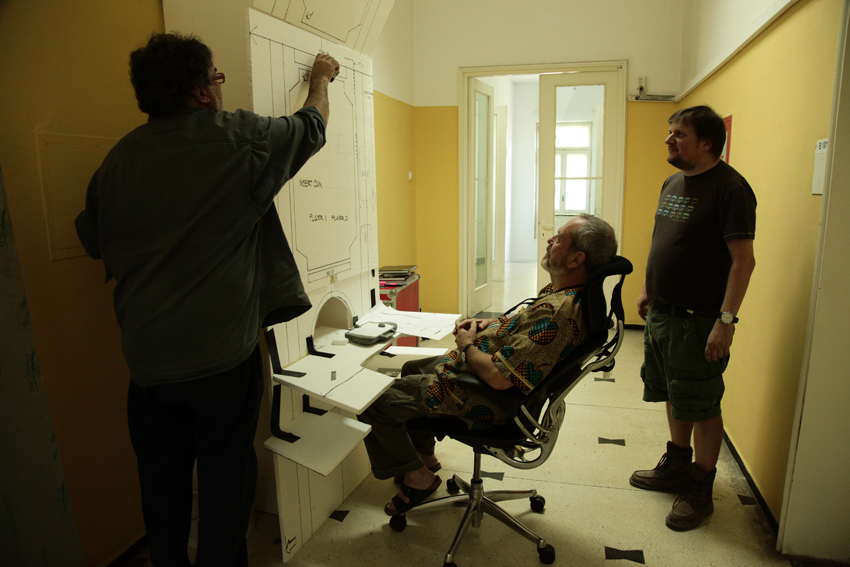
Nicola Pecorini, Terry Gilliam and Dave Warren review a model for Qohen’s workplace workstation
Now over to the visual references, and the work of Neo Rauch
That didn’t last very long! I wish I could say it did! The visuals really were in many ways dictated by circumstances. In the end I don’t think that anybody could honestly say that we were inspired by him. You’ve seen his work, so many things crammed in normally you’d think were disconnected – even from different centuries, and colours, and it’s that here in the film, that aspect of it. We mix styles, it’s in the near future, but it’s also very retro. It’s what I do, I suppose. And there are parts that are very garish, like Neo Rauch they are shocking. The way the colours and images come together. They are quite wonderfully beautiful.
Dave mentioned Ukulele Ike as an inspiration?
When you are working on things, you listen to certain music, you look at certain books. Whether they actually permeate in the final work I don’t know. But they somehow keep you going. Ukulele Ike was keeping me going. Ukulele Ike was the voice of Jiminy Cricket, and he was the first person to sing Singin’ in the Rain, so there was something chirpy and sweet and ironic. It was certainly the soothing voice in my life.
Are there any other visual references that were important?
I don’t think so, we were just winging it after a certain point. Things just became… whatever… We’ll just use that ba-boom. It was either available or possible, the only thing we had to work with. It was an interesting situation of being in such a rush, and trying to do so much and just faking it and using what we had – as opposed to what we wanted. In the end I felt it freed us up, it took that burden of responsibility of our shoulders, to just play.
Of the production designs, what made you the most excited?
I think trying to build the mainframe, we went out to this disused ruined steelworks, and I was taking those pictures. We were able to actually build it on film, and complete it with CG – the combination. It was good. And I think the beach was a bit of a nightmare but it’s actually very beautiful now, the tropical beach. It’s such a contrast to the rest of the film.
To be honest, Dave’s chapel – the main set – is just stunning. You could shoot anywhere. There’s always something interesting to look at. He did a great job on that. I don’t know if people will see all this, but there is a whole backstory of the character in the chapel set. The set is telling you a lot of things, if people bother to look at it. In the script, it’s a burnt out chapel. It says one thing: that the old faiths / religions are dead. It’s saying that at one level.
But then you look at the room, and you see at one point he was doing some building work. He put an Ikea kitchen in, what’s going on here? Why is there a pink chaise longue? It’s a sexy thing, what’s that doing there? In the corner there’s a cement mixer and building materials, on the table there’s plans. So clearly something was going on here. It’s about his life: he bought this burnt out chapel, he was in love with somebody. He bought it obviously cheaply. He comes in there gets plans, we’re going to do it up. It’ll be a great place. And then that relationship falls apart. That’s in there for people who want to look.
Moving to the costumes, could you select your favourite costume?
The strangest one was the simplest. At the end of the film, Qohen is transported in his soul-searching suit, he ends up in his pyjamas and that was a decision I made the day before. I suppose I was thinking of Where the Wild Things Are with Max in his pyjamas. The weird thing about the pyjamas, because they are striped, they look like they are from a concentration camp. It was kind of an accident; it wasn’t planned, thought out or intellectualised, but the moment he is there, all those resonances come out. There’s something about it that I just love, it’s so utterly simple and yet slightly disturbing. We have costumes that are complicated and beautiful, but that just says something to me, that just stuck. When you dream you are in your pyjamas, you are a boy again. You are where the wild and dangerous things are.
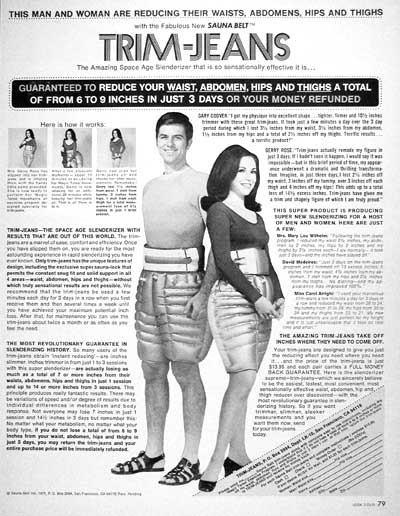
Nicola said you were winding Matt Damon up about how cheap his costumes were…
Yes, it was Carlo finding this Chinese market, buying fabrics by the weight and not about length. It was terrible stuff, just horrible material. Matt was just sweating, the material didn’t breathe.
Do you remember what Trim Jeans were like? They were these rubber plastic-like trousers you put on over your waist and down to below your knees. You pumped them up manually, so it made your legs sweat. We’ve got a modern fashion statement. You can also lose weight wearing them. It was pretty rough on Matt, because we had all these lights and green screens. He’s got to wear a wig, and these terrible clothes. I think he’d put on weight for Elysium, but he’s a much slimmer person now!
On hair and make-up, completing the look, can you select one of the characters?
It’s very simple, my favourite is David Thewlis’s hairstyle. We put a toupee on him, and playing around we put it on backwards, and it worked even better. A man who is sitting in front of a mirror, trying to get it right but he’s got it completely and utterly wrong!
Within MediaPro’s facilities, could you tell me about the watertank where you did the underwater sequence and the space sequence… How was it?
It was a disaster, basically. The first thing was they said they’d got a tank, so we said “OK great, we’ll use it”. Then we discovered the tank leaked, but it leaked backwards. Ground water was coming into the tank and it was probably a bit toxic, so they apparently completely redid the tank, with waterproof cement. Then we painted it, it was supposed to be blue screen. We painted it, and the blue ended up being purple, which is not the colour one wants. It also reflected strangely the lights which caused a lot of problems with the matte, doing mattes in CG.
The point is we tried to make the water as clean and pure as possible for the space sequence because we didn’t want any refracting light and bubbles and all that shit. So it was pumped and pumped and pumped for about a week or so and unfortunately the day we got in there and starting shooting, I noticed that a tube was recirculating the water, there was a waterfall going on. I said, “What the fuck is this?” Because a waterfall from ten feet up is aerating water which is creating bubbles in the water which refract the light so it isn’t the clean and pure water we are looking for in the space sequence.
So we already are in trouble, and the other thing the water had to be heated, we had a huge volume of water there, and heaters for whatever reason were turned on soon enough and poor Melanie, who was not looking forward to it, and suddenly they are all freezing, and it’s too cold. So it continued to be a nightmare. Of course things were delayed constantly, and Dave and the Art department were supposed to have three days to prepare the beach because we had to lower the water after we have done the space stuff, revealing the area which would be the beach, get the sand and everything in there.
Of course none of that happened and it had to be done overnight. So everything in the tank was a nightmare, and the nightmare has continued until the nightmare ended just two days ago, all the shots were going it’s a knock on effect. It’s supposed to be the dream tropical beach, and it was the horror of the film!
During those days did it really feel as though film might not get finished?
It was just horrible, everybody was completely exhausted. We worked eight days straight, the water being not only unclear, but horrible. Melanie and Christoph were just, they couldn’t find, trying to communicate with them underwater, looking left where the camera is… they couldn’t see the camera. I went in one day and there is a scene where Melanie dived down and pulled Christoph out of these weeds that are entangled up, I couldn’t find him. I suddenly realised how impossible it was for them, and how sturdy they were to carry on in a nightmare situation. And they kept doing it. I thought this is madness, utter madness.
By the end we got this one incredibly important shot, the penultimate shot of the film, and I looked down there I saw [Director of Photography] Nicola asleep, leaning up aside the side of the tank!
Everybody was so tired, exhausted. We had the problem of the beach. When we got down there, the sand has got to be virginal sand, the only footprints we want to see are Melanie’s footprints, where she walks down, that’s all! When you are doing a scene, people are moving around, the sand is all going to be rucked up. People brought some brooms. But the brooms didn’t work. I said “Come on, what we need is leaf blowers, maybe something like that will do it.” We were told there were no leaf blowers in Bucharest, I was actually told that. I said, “Wait a minute… every day in the studio there leaf blowers going off, we hear the noise.” The effects guys ran out and it took them two hours before they got back with leaf blowers.
So before we did the very first shot, the day was disappearing. It was finally around lunchtime we finally got a shot in. And Christoph was gone in two days. It was horrible. The sheer exhaustion of everybody was… the fact that we pulled it off and actually done it and when you see the film you won’t sense one iota of this. It’s all beautiful and lovely and dreamlike, yet the reality was the opposite!
An altogether happier day was one with the three doctors. That went pretty smoothly…
That was a day when we ended up with time on our hands, it was so lovely. We had a set that was controllable, we weren’t dependent on others who might fail. We went in there Ben, Peter and Sanjeev. We just did the shots. And suddenly there’s time on our hands. I probably should have, there was a couple of other shots I might have been able to pull off. But I thought fuck it, we’ve got everything we need, let’s go home. A great day, and a great dinner at the end of the day. That was the highlight.
I remember watching Peter chewing gum, and he was playing with his gum, and I was thinking that Terry will just want to keep the camera on Peter for the whole of the sequence.
That was the problem…. On that day, everyone was doing wonderful things. It’s all there, but the scene is cut down to the length it should be but in fact all the doctors are going to get a copy of the scene as it was originally cut. Everybody doing what they were doing, it was just brilliant. Peter is trying to kick cigarettes, he’s got the Nicorette, he’s got the patches on and he’s scratching. Then Ben is out there in some dreamscape – vain beyond belief, testing his own heartbeat. And then we’ve got Sanjeev slowly collecting everything that’s on the desk, sniffing everything, he’s got some phobia about the smell. He’s constantly sniffing and smelling things.
The doctors were brilliant, but poor Christoph just had to lie there. The sad thing about that scene is that in the end we didn’t have Christoph get up because we did spend a little bit of money on this incredible couch, or bed, in the shape of a human being: all the veins and everything in it.
The visual effects shots, how many are there?
I think we ended up with something over 250. A fair number for a film of this budget.
Which is your favourite?
Oh shit. None of them anymore, I hate them. It’s one of those things, everything was hard. We are a demanding lot, for this kind of budget. Everybody worked incredibly hard, so it’s really hard to have a favourite because I’m now forgetting what we did. But there is one moment that I just love, it’s the black hole, with this tiny figure of naked Qohen in a foetal position floating up towards the black hole. It was a lot, I think in the end we are incredibly pleased with everything we managed to achieve with so little.
The black hole seems to be a metaphor for several things, but is there a Freudian thing going on there?
I don’t actually think in Freudian terms, but you could argue… Yes. It’s a darkness you don’t understand… it’s gigantic and it’s supposed to be sucking the life out of you, a massive void. But it’s not about penetration!
Could you talk about the problems of creating the virtual beach effects?
It was quite easy basically, get some nice sunsets… the hardest part of the beach was we didn’t have any time to test anything. One of the things we probably we shouldn’t have done is have so much blue up on the ceiling, because we were spilling blue everywhere, and so many things were picking up the blue, which you had to get rid of later. That was the big problem, but I think the hardest thing was trying to get the beach extending out with all the water and everything and make it totally believable. Everyone is doing water in films now. But they are working on budgets that are phenomenal. The kind of shots we are doing they would have the budget of the film to do. So that was the hard part, it was trying to make something that was as effective as the big films are doing, but for a miniscule percentage of the budget.
Can you talk about shooting the adverts in London?
One day we had, on the street when Qohen goes to work. We wanted to inundate the world with these talking heads, selling this, selling that. None of that was in the schedule. We got Amy [Gilliam, Terry’s daughter] to produce this sequence. We got a bunch of friends together. This whole thing is about friends. It’s a movie that was made by friends, and with friends. We got Rupert Friend who’s a friend, and his name is Friend. He came in. Lily Cole did her bit, Ray Cooper did his bit. Gwendoline Christie came in, from Game of Thrones. (interview continues below)
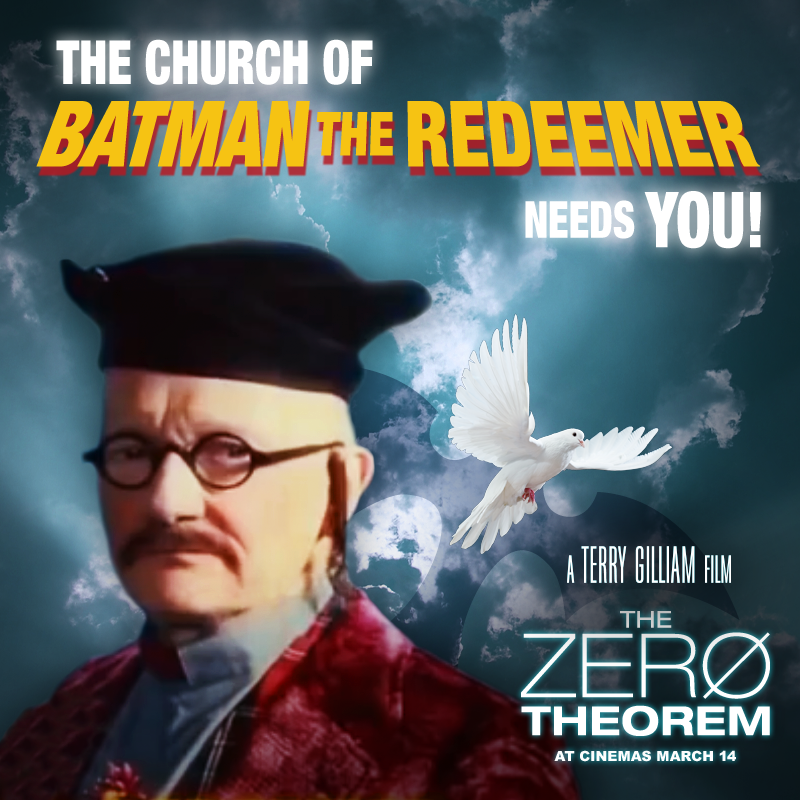
We just got them in, they all came in one after the other. We had a tiny little studio with a green screen back there. We threw some costumes together that we shipped in from Romania. It was like being a first-time filmmaker again. Getting a bunch of friends together, trying funny things on, some weird hairstyles, shooting it – go home. That’s the part of the film in many ways I’ve enjoyed because it’s like the beginning again. Born-again filmmaking is what this was… I’m a born again filmmaker. A lot of enthusiasm, having a load of talented friends and going and faking it.
George told me a bit about the music. He was saying Kurt Weill was an influence and he used electronic sounds
This is great thing about this score, it’s amazing. George is one of the great composers out there, a man who is used to swinging a baton in front of a huge orchestra, making the most beautiful sounds. But there was no money in the budget. The kind of money was just laughable, and George came in – as a friend – and he loved the movie. He completely understood the character of Qohen, and I can say without a doubt, without any hesitation, there is no other composer who could have done this so well. He was the right man, just extraordinary. We hadn’t worked together since The Fisher King. Because of no money, it was just done electronically on his computer. It’s astonishing.
There was one sequence where he felt he needed some real strings. He said we could probably afford three string players to come in on the day – given the budget. I wanted to kill him… Because he brought in 23, out of his own pocket – not the budget, but 23 string players. And they sounded fantastic.
At the party, he just did some wonderful hip-hop stuff. I didn’t think he did that kind of music, but it was like George was free to play. He’s funny, he finds humour in things. And his music never draws attention to itself. It’s just floating in there, stroking the characters, stroking the rhythms of the scene. What was wonderful was being forced to work – just him and his computer.
George composed beautiful romantic music for the beginning of the beach scene, which I thought was perfect but, when we got into the dubbing theatre we realised the scene demanded something different. Normally, with a real orchestra, this would have been impossible to alter in the time available, but George said, “Leave it to me”, and came back the next morning with a freshly composed, utterly brilliant Hawaiian guitar cue. The restriction of working with electronic music allowed us the freedom to solve a problem overnight.”
Let’s discuss the finished film and the themes within it. At the start of the story, Qohen suffers from isolation and loneliness.
No – he’s never lonely. He’s alone but never lonely. There’s big difference, that’s a big theme in this film. The idea that in this super connected world, where is the room to escape, to define yourself as to be alone, but not lonely? I’m obsessed about this.
Then let’s make it clear!
Now everybody just seems to be an extension of their friends, because they are so connected. What are they when they are actually alone, with nobody but themselves? Can they exist anymore? I think that is when you actually make sense of who you are. So that’s one of the things that attracted me to this movie.
Qohen seems to have a fear of making relationships
Life has been hammering him, and maybe he has had too many disappointments, and he just wants to be alone. He doesn’t want to be vulnerable; he doesn’t want to be hurt again. And then he’s got this job where everybody is bright and shiny and colourful. They’re buzzing around. They’re young. He hates it. He wants to be at home, he’s waiting for this call that’s going to change his life, that’s going to give it meaning.
A further theme is the pointlessness of mathematical modelling to derive any meaning out of life.
Yes, correct. Algorithms rule our world now it seems to me, everybody has such faith you can find the equation, the algorithm that will make you rich if you happen to be a banker. The whole banking system is based on algorithms. And look what happened last time! The idea that you can measure and quantify life just I don’t buy it, that’s all. A lot of people are making a lot of money trying to quantifying it to a certain degree, obviously many corporations. When Amazon asks me every so often would I be interested in buying. They are quantifying my life, its going on around us sometimes it’s nice and pleasant, sometimes it’s useful. But it’s not the answer.
There was a news story a few days ago – bins that were tracking and logging mobile phones as they were going past.
Great!
They turned it off because of some privacy fears
The privacy thing is there. We don’t have privacy, that’s been removed already. It’s gone. So that’s a fact. Did you see the thing I did for ComicCon? The NSA is getting all the noise now. Here it is. How do you turn the tide back? You probably don’t, you have to learn to live with it. Start editing your life, deciding what you’ll pay attention to and what you won’t.
True engagement with others in the world is not through electronic devices
I’ve got this obsession about how do you live the moment, and experience the moment? Now when you’re having a dinner, someone’s tweeting “I’m having a good time with these people”. Well, have the good time, don’t comment on it. Everything is being commented on now, to the point where I do switch off on my little mountain top in Italy with no phone, no television, no Wi-Fi. I don’t know if it’s me being an old fart, but people have really got to reclaim their lives.
Engagement in the world through caring for others
The important thing is caring for others that are first-hand acquaintances rather than caring for the poor displaced starving people in Africa. That’s important, but more important is what’s first hand, the people right there, who you are with, and that’s what Qohen is frightened of, getting involved again. That’s what happens in the film. He is invaded. And he has to become involved and I don’t know if he becomes a more tragic person or a more vulnerable person, but he changes – that’s the important thing.
Anything else that you want viewers to see in terms of a message within the film?
I don’t really like describing the film or even the themes, I think fuck it, people are left to work it out for themselves. My agent saw it when I was in Italy. I talked to her. I had to actually get on the phone. She wanted me to explain the end of the film. That’s not my job, I said, my job is to make it, and people will have their own response to it. That to me is what I like. I like the idea of people coming away from it with very different ideas about what the end is. To me it’s very simple. But already I am hearing much more complex endings, more bizarre endings, people can see what happens there. And think what they think that to me I find just extraordinary. Somebody thinks he’s dead. Well if that’s death, that’s a pretty interesting afterlife!
Would you shoot again in Bucharest?
Yeah, now I know the people not to use. I know the good people and the less good people.<
You know your way around
That’s the thing. I really enjoyed working with the Romanians, I liked their attitude, and I liked their energy, their sense of humour. Wonderful people.
There was one dog in particular that was already hanging around on set and falling asleep on the green screen material
A little pup that turned up. There were a lot of dogs. There was one little one. Andy who was the digital genius, I think he took the dog.
You’ve got an opera, Benvenuto Cellini coming up. Is that date fixed now?
At the end of May 2014
Does that prevent you from taking on another project?
I won’t be shooting until Autumn 2014, there’s no way I can do anything before. Assuming something might happen, who knows? I’m just a bit exhausted at the moment, and I’ve got to do interviews for the Time Bandits restoration. Time Bandits looked great the other night. It was really well worth doing a little tidying up.
Is there another project in the pipeline for Autumn 2014?
Thinking about this film is making me crazy. Next week we start thinking about where we go next. There’s old Quixote waiting in the wings. I’m going to have a couple of meetings before we even think that we might have a go at it again. We’ll see…
